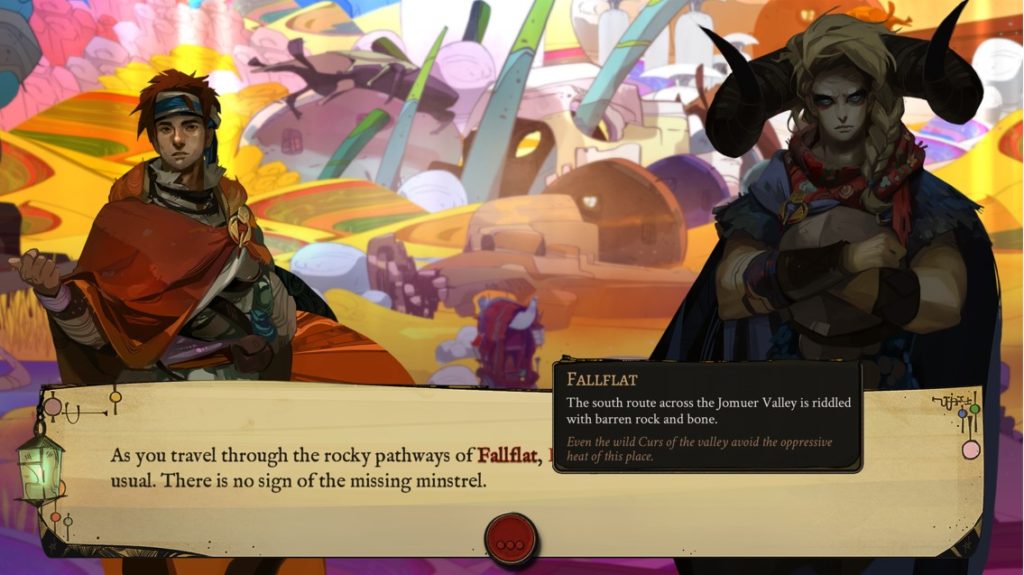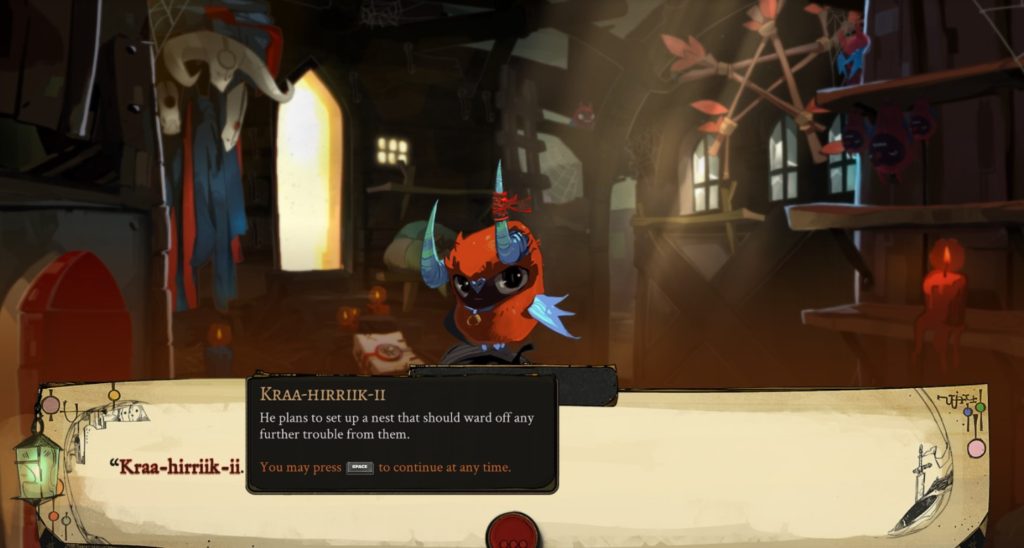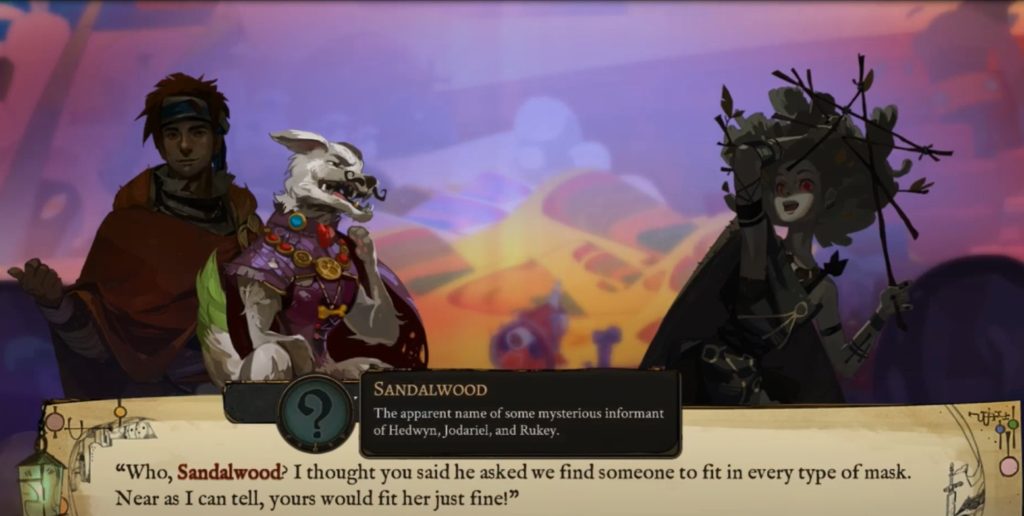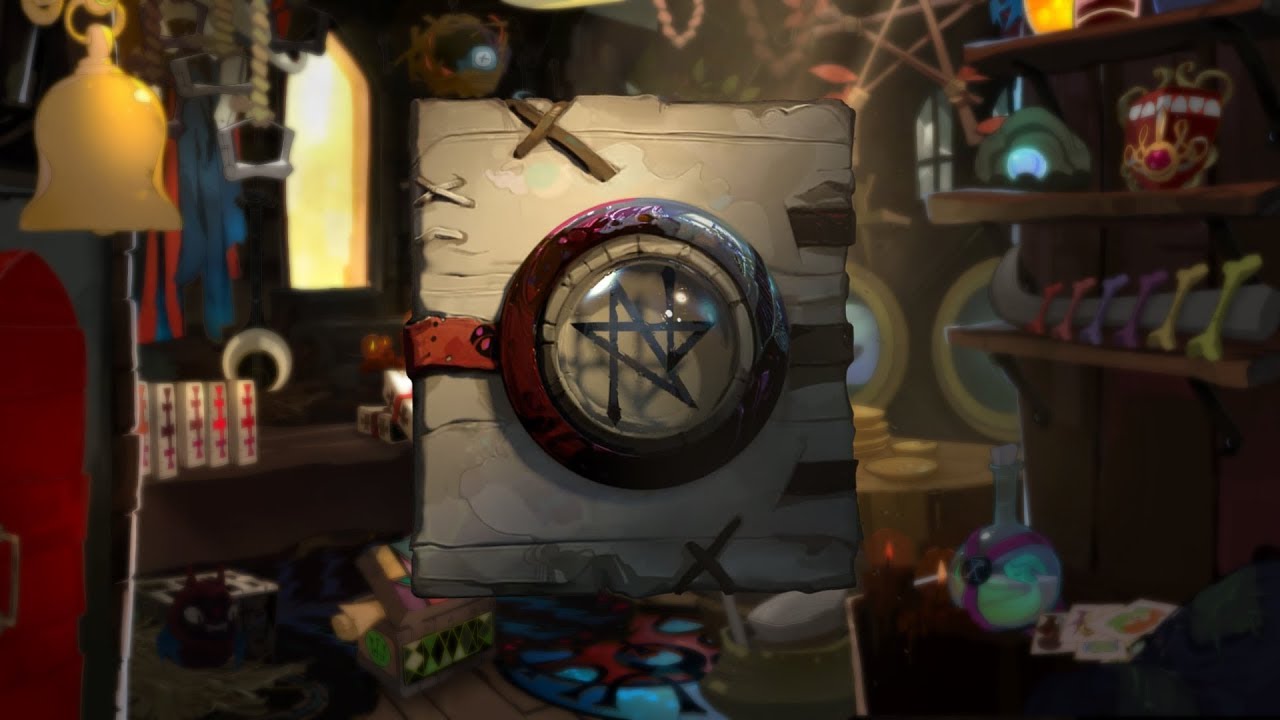The Pros(e) of LexiCons
Perhaps the greatest barrier to entry for the high fantasy and science fiction genres exists within the use of complex naming schematics. Names and foreign words can often go unexplained in the original prose and sometimes require either prior knowledge or the use of a lexicon, which is commonly found in the back of the book. This system of learning the new words unique to the vocabulary of a specific series can be cumbersome and often turns away new readers as they become discouraged for not understanding the fantasy jargon.
A popular TikTok that pokes fun at Dune’s infamously hard words to understand, and how the book can be inaccessible to newcomers.
Supergiant Games’s 2017 project Pyre, however, is able to create a system in which the players can view unknown, fabricated words with just the slight hover of a mouse. The names of locations, characters, and deities are always highlighted so no matter how many times one forgets a them, they will always be reminded.

The very act of creating a system very effective and convenient for the players allows the Lexile level to be lowered without lowering the complexity of the text. If you are unfamiliar, a Lexile level is a score that represents a texts difficulty level; thus, the reader can make an informed decision on whether they are suited for the material before testing it out. This allows the wonderful story of Pyre to be accessible to many. From a game design perspective, it also incentivizes players to stick around during the story segments instead of skipping right through. Games are a unique medium in which players have more flexibility in which they can be enjoyed, so this element can help hook in players who are present more for the game mechanics itself. It is a medium that needs to be wary of its player’s attention and dedication.
Diegeticaly Built into the Game
Furthering the brilliance of Pyre’s design, this system of being able to scribe and learn more information is contextualized and true to the narrative of the game. As you play as a reader in a realm where literacy is condemned; therefore, you are able to interact with text differently than all other characters in the game. There are times where you utilize this ability to have real in-game plot and story relevance.

This instills within the player a truer sense of their abilities as they are able to actively utilize their player’s literacy to help improve their own. A common antithesis to the encouragement of this feature I could see developing is that readers could argue that part of the mystery around words adds to the experience of a narrative. Pyre directly addresses this issue by having names that are not familiar to the player, such as the informant of the Nightwings, be vague and nondescript.

The writers and designers of Pyre did a masterclass job in integrating this dictionary system into their game. Not only were they able to aid in the accessibility of players who could now better understand their narrative but also made the system work digeticaly, furthering player-character immersion for you can access the character’s base pool of knowledge.


This was a really interesting post! I definitely also thought that this was a really smart aspect of the game. In a way, it’s like taking advantage of something only video games (or maybe eBooks) could do–that is, to mouse over things, or to immediately be brought to a definition, as opposed to having to page through an index. It also sidestepped the issue of necessarily needing the contextualize the information in the other prose. In my opinion, a good fantasy or sci-fi novel can usually give readers at least some sense of what foreign words mean without *needing* an index, but here Supergiant gave themselves a mechanism through which they could actually write more naturalistic dialogue. As in, they’re not limited by having to subtly-but-believably explain every concept as it comes up. Anyway, thanks for pointing out a really smart thing this game does writing-wise!
This is a really good observation, and I like how you tied it to the unique abilities of the protagonist within Pyre. I have mixed thoughts on the system- I really like the thematic importance you pointed out, but typically, writing advice will suggest that authors should weave exposition diagetically into the text. This can make learning the rules of the world feel more natural, and incorporate the circumstances into the opening scenes. I think that Pyre already does this, to an extent- looking at the example of the “Sandalwood” definition, pretty much all of that information was already implied in the text onscreen.
I just finished playing a game series that had a very traditional index system, and I think that Pyre’s model is much more effective- when playing the other games, I sought out index entries on concepts or characters that I liked or cared about, but if I didn’t recognize something, I’d either forget to look it up or just not bother. I think Pyre works much better, because it lets players immediately act on curiosity, and can act as a quick refresher if they forget what a word means. Yet, I still think dictionary systems pull a player out of the game’s diagesis to do “work” in order to understand a game, and I’m not sure it’s the best option for immersion. It’s interesting to weigh these different solutions for explaining complex fantasy worlds to the players, and the way we consume and order information during interactive experiences versus non-interactive.
I think you have a very good point about how Pyre provides literary simplicity here. A lot of other RPGs will have mouse-over links in dialogue, but they will often send the player to lengthy and convoluted codex entries that few take the time to fully read. I think Pyre does a great job of simplifying a summary of every new word into just one or two sentences. Pyre does have a codex of course – but even the full entries in the book are quite short, each one takes only a few seconds to read and understand. While an incredibly detailed and well-described fantasy world can be very fun to learn about and enhance a player’s experience, Supergiant did a great job of realizing in Pyre that sometimes, less is more.